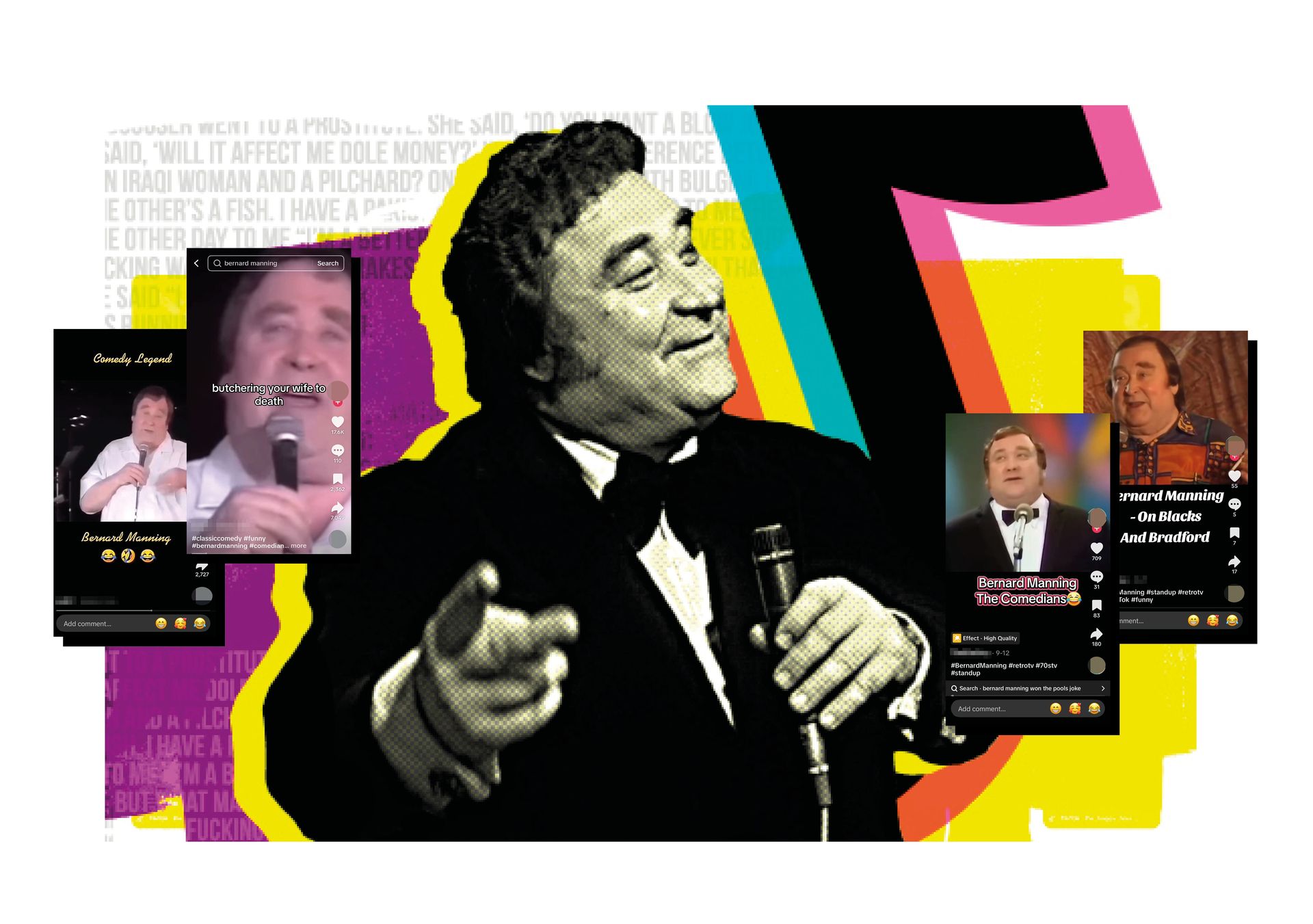
Bernard Manning and examples of the proliferation of clips of the comedian on social media, some of which contain racist slurs
EIGHTEEN years after he died, Bernard Manning, an 1970s comedian who made his name on the club circuit of the north of England and who died aged 76 having been dropped by broadcast TV channels, is back in fashion.
Manning’s brand of ribald and explicitly racist humour fell out of favour in the 90s when it fuelled a backlash from a new wave of political comedians that included Ben Elton and Rik Mayall.
But sketches from the 1970s and 80s featuring racist slurs including the N word are now going viral on TikTok and Instagram, shared by millions and boosted by the algorithms of the social media giants.
Manning became famous in Britain through appearances on ITV’s The Comedians in the 1970s. For those sketches he watered down some of his most offensive language, but the sketches going viral on TikTok and as Instagram reels feature some of his most explicit material.
“There’s two South Africans walking through the jungle and there’s a lion there licking another lion’s arse”, begins one of the sketches in circulation. It continues: “He says that’s a bit unusual? No it’s just eaten a N******. He’s trying to get the taste out his mouth.”
Joe Mulhall of the campaigning group HOPE not hate, which tracks the rise of the far right across the UK, says that he has noticed the viral Manning videos on his feeds. “One of the biggest problems we currently face is the creeping normalisation of racist language both on social media and on our streets. It’s not necessarily that there are more racists now but rather that they feel more confident to say it out loud, less concerned there will be consequences or pushback,” He adds: “Where once the major platforms at least pretended to care, some, most notably, Elon Musk’s X, are now actively disseminating and promoting this sort of content.”
Commenting on the trend, comedian Alexei Sayle says: “The revival of Bernard Manning is in tune with the Nazi party values of the UK right.” And Lise Mayer, writer of the 90s cult comedy The Young Ones, says: “We were explicitly reacting against the casual racist misogyny of Bernard Manning and his ilk. It’s extraordinary if all too believable that he is now back in fashion.”
Elon Musk may have pronounced that X, formerly Twitter, is the “de facto public square,” but for millions of people around the world – including a massive proportion of younger generations – TikTok is the de facto platform of choice.
A recent report by Ofcom found TikTok has overtaken broadcast TV and YouTube as the most popular platform for those aged 15-24 to consume video content. The company touts its own research finding that three-quarters of users say the app has the greatest influence on cultural trends.
This makes the fact that videos of Manning making racist comments including using the N-word and the P-word can be seen via the app’s tailored algorithm, all the more concerning.
The Nerve was made aware of the existence of this content by a concerned mother whose son had come across a video where Manning makes a joke about hating his wife on Instagram Reels. Other questionable content on the Meta-owned video sharing platform included a Manning joke about a Pakistani man going to heaven. The comedian refers to the man as a “p*ki”, and features a punchline in which Saint Peter asks the others in heaven if anyone ordered a taxi.
That video, hosted on TikTok competitor Instagram Reels, has been seen 377,000 times, with other videos of his jokes, many of which would be considered distasteful or racist today, seen millions of times.
The videos “are upsetting to watch and ridicule and make fun of differences where in reality we are all humankind,” says Zlakha Ahmed, CEO of Apna Haq, a Rotherham-based race relations charity. “The videos should be banned as they contribute towards sustaining and creating continuing hostility to anyone who is different.”
According to Steven Buckley, a social media expert at City St George’s, University of London, “the engagement with old Bernard Manning content can serve as a point of reflection for many young people on the platform as his now wildly dated and typically perceived distasteful comedy, shows how much comedy as well as society's taste for humour has changed over the decades.”
Buckley hopes that it would be used to show how comedy used to be, and how things have evolved.
But there are worries that simply seeing that content could normalise such behaviour. Earlier this year, Ofcom opened a consultation on strengthening requirements for platforms to limit harmful and illegal content going viral in order to protect children. The consultation closes later this month.
A TikTok spokesperson did not respond to The Nerve when approached by the company to ask whether they adhered to the platform’s guidelines, which prohibit “content that promotes hate or attacks people based on protected attributes like race, religion, gender, or sexual orientation.” But the videos were swiftly removed.
That's the right decision, said Carolina Are, a fellow at Northumbria University’s Centre for Digital Citizens, who has studied how social platforms often fail to enact their content moderation policies. But it highlighted the haphazard approach of platforms to policing content – only taking down offending content when made aware by the media. “This contradicts TikTok’s safety and human rights ethos, and it’s an interesting choice because they are much more stringent on non-violating content like lingerie,” she explained.
Instagram did not respond to a request for comment.
